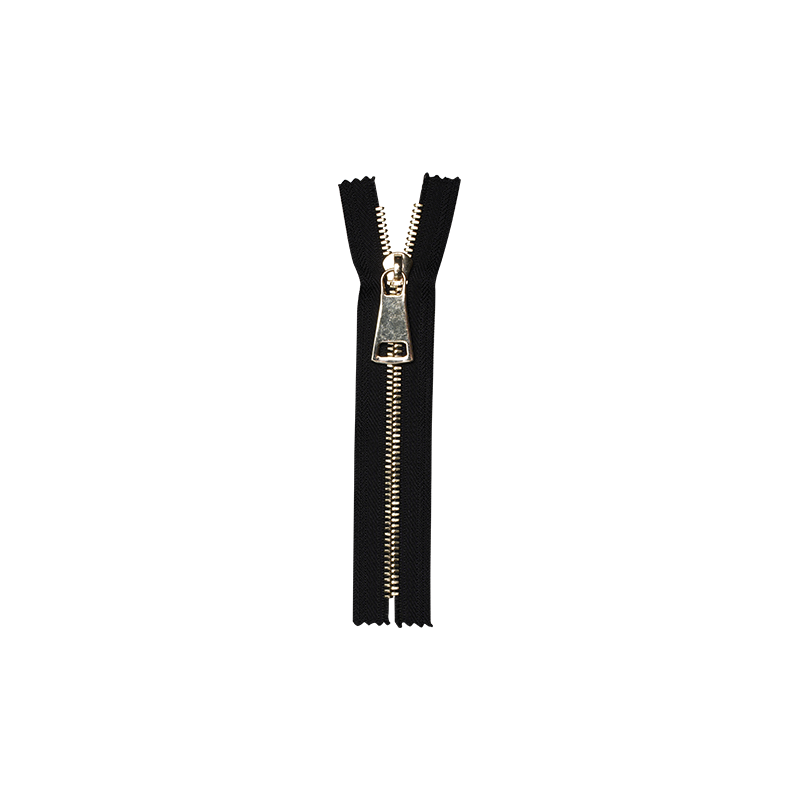Metal zipper chains are commonly used in jackets, jeans, bags, tents, and outdoor gear due to their strength, durability, and premium appearance. However, one of the most frequently asked questions by consumers and manufacturers is: Do metal zipper chains rust easily, and how can rust be prevented? The answer depends on several factors, including the type of metal used, environmental exposure, and maintenance practices. Below is a detailed breakdown of the issue, explained in key points.
1. Do Metal Zipper Chains Rust Easily?
The short answer is: It depends on the material. Not all metal zippers are equally prone to rust.
Brass zippers are the most common type. Brass (an alloy of copper and zinc) has natural corrosion resistance. It does not rust in the traditional sense (like iron), but it can tarnish or corrode over time when exposed to moisture, salt, or chemicals.
Aluminum zippers are highly resistant to rust. Aluminum forms a protective oxide layer when exposed to air, which prevents further oxidation. This makes aluminum ideal for marine or outdoor applications.
Nickel-plated or steel zippers are more vulnerable. If the plating wears off, the underlying steel can oxidize and form red rust when exposed to moisture.
Therefore, while high-quality metal zippers (especially brass and aluminum) resist rust well, they are not completely immune—especially under harsh conditions.
2. What Causes Metal Zipper Chains to Rust?
Several environmental and usage factors can accelerate corrosion:
Moisture and Humidity: Prolonged exposure to water or high humidity is the primary cause of rust, especially if the zipper is not dried properly after use.
Saltwater or Chlorine: Swimming in the ocean or pool can leave corrosive residues on the zipper. Salt and chlorine accelerate oxidation, particularly on brass and plated metals.
Sweat and Body Oils: Acidic sweat can react with metal over time, leading to discoloration and corrosion, especially on clothing zippers.
Lack of Protective Coating: Some low-cost zippers lack proper anti-corrosion coatings, making them more susceptible to rust.
Friction and Wear: Repeated use can wear down protective plating or finishes, exposing the base metal to the elements.
3. How to Prevent Rust on Metal Zipper Chains
Preventing rust is easier than repairing it. Here are several effective methods:
a) Choose the Right Material
Opt for brass or aluminum zippers for better rust resistance.
For marine or outdoor gear, aluminum zippers are the best choice due to their lightweight and anti-corrosive properties.
b) Apply Protective Coatings
Many high-end zippers come with anti-corrosion coatings such as clear lacquer or resin finishes. These create a barrier between the metal and moisture.
You can also apply a thin layer of silicone-based lubricant or wax to protect the teeth and slider.
c) Keep Zippers Dry
After exposure to water (rain, sweat, swimming), dry the zipper thoroughly with a clean cloth.
Store items in a dry, well-ventilated area to prevent moisture buildup.
d) Clean Regularly
Use a soft brush and mild soap to clean dirt and salt residues from the zipper chain.
Rinse with clean water and dry completely. Avoid harsh chemicals that can damage protective layers.
e) Lubricate the Zipper
Use a zipper lubricant or a small amount of paraffin wax to keep the slider moving smoothly and reduce friction that can wear down metal.
Do not use oil-based products like WD-40 long-term, as they can attract dust and degrade over time.
f) Avoid Contact with Corrosive Substances
Keep zippers away from bleach, strong detergents, and acidic materials.
When washing garments with metal zippers, use a laundry bag and choose gentle cycles to reduce wear.
g) Store Properly
Store clothing or gear with metal zippers in cool, dry places.
Avoid plastic bags for long-term storage—use breathable fabric garment bags instead to prevent trapped moisture.
4. What to Do If Rust Appears?
If minor rust or tarnish develops:
Use a soft cloth with a mixture of baking soda and water or a specialized metal polish to gently clean the affected area.
For tougher rust, a vinegar and salt solution can help, but rinse thoroughly afterward and dry immediately.
Never scrub aggressively—this can damage the zipper teeth or coating.
If the zipper is severely rusted or stuck, it may need to be replaced to avoid damaging the fabric.
While metal zipper chains—especially those made from brass or aluminum—are generally resistant to rust, they are not completely immune. Exposure to moisture, salt, sweat, and poor maintenance can lead to corrosion over time. By choosing high-quality materials, keeping zippers clean and dry, applying protective treatments, and storing items properly, you can significantly extend the life of metal zippers and prevent rust. With proper care, a metal zipper chain can remain functional and attractive for many years, maintaining both performance and appearance in a wide range of applications.


 en
en  русский
русский 한국어
한국어 get a free quote
get a free quote
















